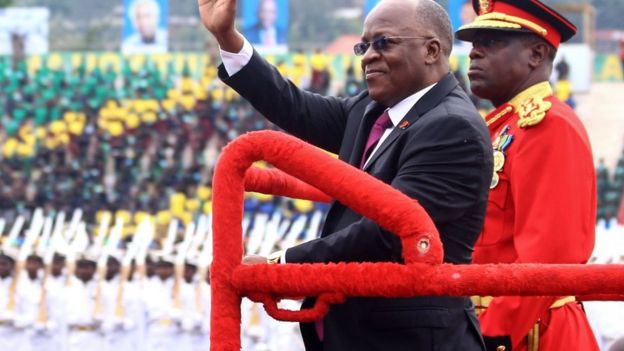 Maxence Melo has appeared in court more than 100 times in the last three years
The Tanzania Editors' Forum noted in 2018 that at least five newspapers and two radio stations had been suspended for between three and 36 months.
Freelance journalist Erick Kabendera's arrest in July 2019, initially on questions over his citizenship, which later changed to money-laundering charges, drew international condemnation. His court case has faced a series of delays and he has been in detention ever since.
Tito Magoti, 26, spent the festive period in remand after being arrested by authorities on 20 December in the main city, Dar es Salaam.
In 2016, Mr Melo was charged under the same Cybercrimes Law. He was accused of obstructing an investigation when he refused to hand over the details of people who post on the website.
Maxence Melo has appeared in court more than 100 times in the last three years
The Tanzania Editors' Forum noted in 2018 that at least five newspapers and two radio stations had been suspended for between three and 36 months.
Freelance journalist Erick Kabendera's arrest in July 2019, initially on questions over his citizenship, which later changed to money-laundering charges, drew international condemnation. His court case has faced a series of delays and he has been in detention ever since.
Tito Magoti, 26, spent the festive period in remand after being arrested by authorities on 20 December in the main city, Dar es Salaam.
In 2016, Mr Melo was charged under the same Cybercrimes Law. He was accused of obstructing an investigation when he refused to hand over the details of people who post on the website.
'We have a team of 18 lawyers'
Jamii Forums was shut down for 21 days in 2018, forced to comply with harsh new online content regulations. Despite the brushes with the authorities, facing legal actions and intimidation, Mr Melo has remained undeterred - and has also found acclaim. Trained as a civil engineer, Mr Melo calls himself an "accidental journalist"
He told the BBC that since the shutdown last year, they have had to hire multiple lawyers, redo their editorial policy and hire more people to check all contributions on the website before they are published.
"We have a team of 18 lawyers. We had to rethink, restrategise, we had to welcome the University of Stanford to review our strategies, to review our operations and advise on better ways of doing our work," he said.
Still, he said, people cannot talk freely.
"Initially people were free, people could talk, you could do a little kind of editing of the comments they post on the forum.
"You could [make a] call to some civil servants and even politicians and they could comment on something. But at the moment such possibilities are no longer available," he told the BBC.
Trained as a civil engineer, Mr Melo calls himself an "accidental journalist"
He told the BBC that since the shutdown last year, they have had to hire multiple lawyers, redo their editorial policy and hire more people to check all contributions on the website before they are published.
"We have a team of 18 lawyers. We had to rethink, restrategise, we had to welcome the University of Stanford to review our strategies, to review our operations and advise on better ways of doing our work," he said.
Still, he said, people cannot talk freely.
"Initially people were free, people could talk, you could do a little kind of editing of the comments they post on the forum.
"You could [make a] call to some civil servants and even politicians and they could comment on something. But at the moment such possibilities are no longer available," he told the BBC.
'Drastic decline' in media freedom
He says that they have to get the lawyers to speak to sources to assure them of their security or privacy when they get attacked in any way for their contributions. He laments about the "shrinking" media space amid a significant drop in Tanzania's freedom of the press ranking. In last year's World Press Freedom Index published by Reporters Without Borders (RSF), the country dropped 25 places - to 118 in the world. "No other country in the world has experienced such a drastic decline in press freedom in the past four years," the head of RSF's Africa desk, Arnaud Froger, noted. "Silence or persecution seems to be the only alternative for media outlets and journalists that want to exercise a critical role in Tanzania." The government insists there is freedom of expression in the country - and says journalists and commentators are free to do their job unless they commit a crime. The Jamii Forums co-founder says that in his daily operations, he now has to consider the multiple agencies that regulate the media in Tanzania and his organisation has to review what they publish more than five times. "We have the TCRA [Tanzania Communications Regulatory Authority], the police, the board for the media - you have even the regulations themselves for the online platforms like Jamii Forums, the ministry of infrastructure… "Also as part of the Cybercrimes Act, you find yourself in the middle of all these different organisations or institutions and we have to make sure that the kind of content we take to the public is fact-checked, reviewed to ensure it is in compliance with the country's laws."Working with the government
He is worried about what this portends for the future, especially because of the elections due this year. He thinks 2020 might be better for press freedom in Tanzania, but also points out that it is something "you can't predict much, as long as it is the year of elections". "So it is a challenging time to us, it's a challenging times for the sector… everyone is worried about what might happen in the upcoming elections." President John Magufuli is accused of having little tolerance for dissent
Despite the crackdown on journalists by the government in recent times, Mr Melo believes the authorities are listening.
"You see the government might push you hard and you have to push back and you should be strategic to understand who your true allies from the government are."
But he also challenges the current administration to engage the media and other critical voices, who he believes can all work together to fight the common enemy that is corruption.
He points out these are the players who have helped expose the corruption cases that President John Magufuli is currently addressing.
"President Magufuli is a president that everyone believes is fighting corruption… I believe if [he] is for real in fighting corruption, then he needs to engage the media."
President John Magufuli is accused of having little tolerance for dissent
Despite the crackdown on journalists by the government in recent times, Mr Melo believes the authorities are listening.
"You see the government might push you hard and you have to push back and you should be strategic to understand who your true allies from the government are."
But he also challenges the current administration to engage the media and other critical voices, who he believes can all work together to fight the common enemy that is corruption.
He points out these are the players who have helped expose the corruption cases that President John Magufuli is currently addressing.
"President Magufuli is a president that everyone believes is fighting corruption… I believe if [he] is for real in fighting corruption, then he needs to engage the media."
DISCLAIMER: The Views, Comments, Opinions, Contributions and Statements made by Readers and Contributors on this platform do not necessarily represent the views or policy of Multimedia Group Limited.
Tags:
Latest Stories
-
Akesse Brempong to hold ‘Davidic’ concert on April 21
36 mins -
Here’s why Dr. Steve Manteaw supports Otumfuo’s call for ECG, GRIDCo divestiture
51 mins -
Ejisu by-election: Former NPP MP files nomination to contest as independent candidate
1 hour -
Aklerh out with ‘Dancehall Queen’ EP
1 hour -
Burna Boy makes Time Magazine’s 100 Most Influential People
1 hour -
National Peace Council cautions clergy against spiteful comments ahead of December 7 polls
1 hour -
My wife sent nudes to her Dubai lover when I was battling kidney disease – Erico
2 hours -
Kudus urges West Ham to eye Ghanaian youngster Emmanuel Danso
2 hours -
Don’t be cowed into silence, defend Ghana’s democracy – Sam Jonah tells journalists
2 hours -
QNET triumphs at PR Awards 2024 with 3 prestigious wins
2 hours -
Dubai Airport slowly re-opening as UAE rainfall persists
2 hours -
Dumsor: Kumasi demonstrators demand immediate release of load-shedding timetable
2 hours -
Transport operators frustrated by long wait to hike fares
2 hours -
MTN FA Cup: Dreams FC’s quarterfinal game against Soccer Intellectuals set for May 1
2 hours -
Enimil Ashon: Season of promises and scholarship for the greedy
2 hours

